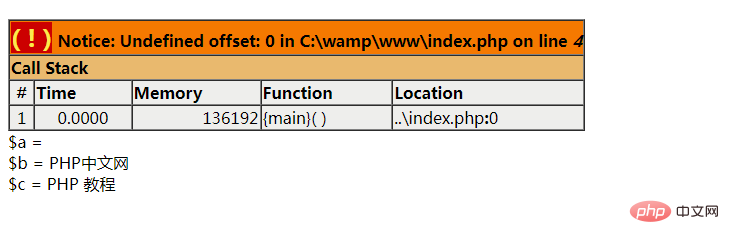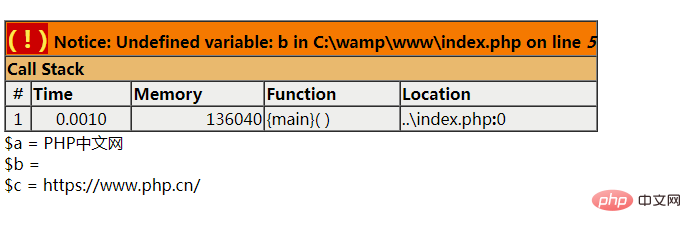
In PHP, list means "list". This function can assign the values in an array to a group of variables, and can assign values to a group (multiple) variables in a single operation; Syntax "list($var1 [, $val2, ...]);". list() is actually a language construct, not a function.

The operating environment of this tutorial: windows7 system, PHP7.1 version, DELL G3 computer
list() in PHP can put an array into The values are assigned to a set of variables respectively. Like array(), it is not a real function, but a language structure. list() can assign values to a set of (multiple) variables in a single operation.
list() The syntax result is as follows:
list($var1 [, $val2, ...]);
where $val1 and $val2 are a set of variables to be assigned, and multiple variables are separated by commas.
Note: list() can only be used to index arrays, and the index must start from 0. In PHP5, list() starts assigning values from the rightmost parameter; in PHP7, list() starts assigning values from the leftmost parameter.
The following is a simple example to demonstrate the use of the following list(). The code is as follows:
<?php
header("Content-type:text/html;charset=utf-8");
$array = array("PHP中文网","PHP 教程","https://www.php.cn/");
list($a, $b, $c) = $array;
echo '$a = '.$a.'<br>$b = '.$b.'<br>$c = '.$c;
?>The running results are as follows:
$a = PHP中文网 $b = PHP 教程 $c = https://www.php.cn/
As can be seen from the running results, The variables in list() are assigned in the order of the index of the array, and the index starts from 0. What happens if the index of the array does not start from 0? Let's look at the following code:
<?php
header("Content-type:text/html;charset=utf-8");
$array = array(1=>"PHP中文网",2=>"PHP 教程",3=>"https://www.php.cn/");
list($a, $b, $c) = $array;
echo '$a = '.$a.'<br>$b = '.$b.'<br>$c = '.$c;
?>The running results are as follows:

It can be seen that $a has not been assigned a value. This is because there is no value with index 0 in the array. If list() is used When not all the values in the array are needed, we can omit some variables in list(), as follows:
<?php
header("Content-type:text/html;charset=utf-8");
$array = array("PHP中文网", "PHP 教程", "https://www.php.cn/");
list($a, , $c) = $array;
echo '$a = '.$a.'<br>$b = '.$b.'<br>$c = '.$c;
?>The running results are as follows:

If we want to assign the value of a multi-dimensional array to a set of variables, we can also nest list(). The following uses a two-dimensional array as an example to demonstrate the following. The code is as follows:
<?php
header("Content-type:text/html;charset=utf-8");
$array = array(
array('PHP中文网', 'PHP 教程'),
array('PHP 数组', 'https://www.php.cn/')
);
list(list($a, $b), list($c, $d)) = $array;
echo '$a = '.$a.'<br>$b = '.$b.'<br>$c = '.$c.'<br>$d = '.$d;
?>The running results are as follows:
$a = PHP中文网 $b = PHP 教程 $c = PHP 数组 $d = https://www.php.cn/
Recommended learning: "PHP Video Tutorial"
The above is the detailed content of What does php list function mean?. For more information, please follow other related articles on the PHP Chinese website!




